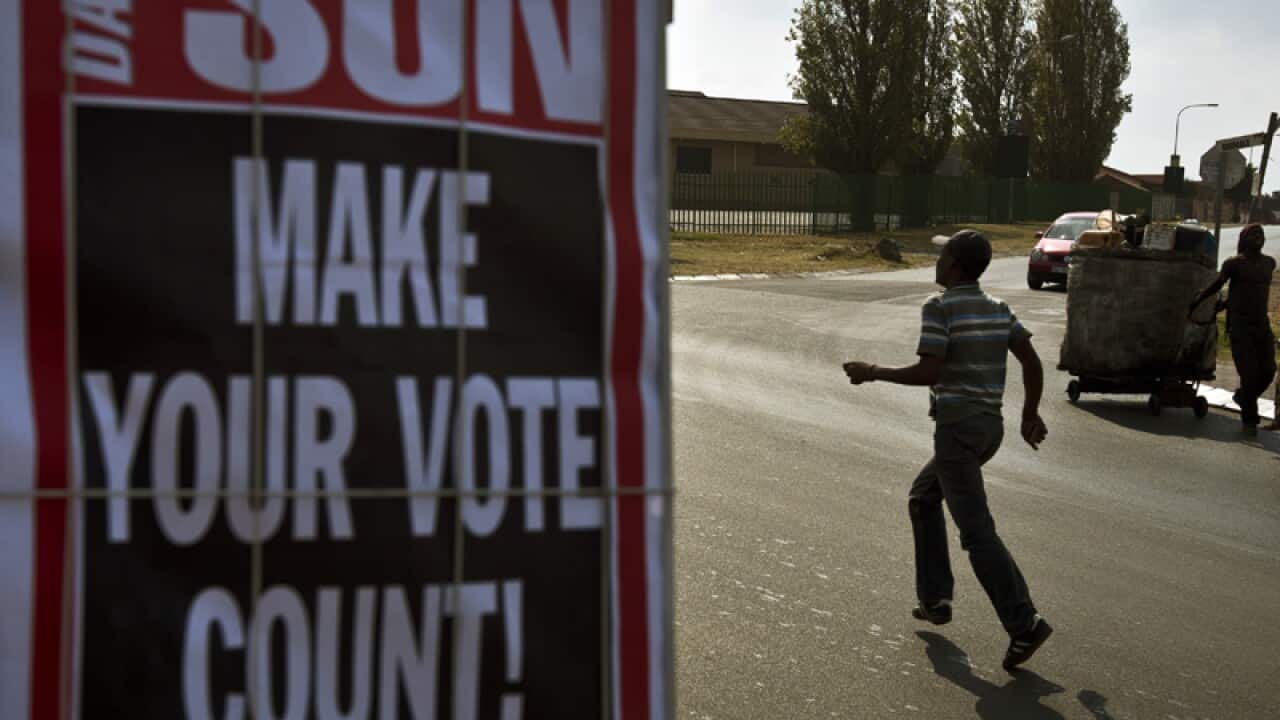Twenty years after South Africans of all colours wowed the world by voting to end apartheid, they shrugged off sporadic violence and flocked to polls, with the ANC expected to return for a fifth consecutive term.
Some 25 million voters were registered for South Africa's fifth multi-racial elections, still determined to exercise their hard-won freedom at more than 22,000 polling centres despite mounting anger over joblessness, inequality and corruption.
"People died for this right. They must not waste it," said Nobel peace laureate Desmond Tutu alluding to unrest in Ukraine and South Sudan.
"I'm so glad we can vote."
But the eve of the ballot was marred by violence, with police and 1850 troops deployed to several areas to keep order.
In Bekkersdal near Soweto, protesters threw rocks at police vehicles and set fire to a polling station.
But residents vowed not to be dissuaded. They poured into the township's 15 polling centres, many on foot and some pushed in wheelchairs and wheelbarrows.
"I'm here to vote for my future, I don't care about what happened here yesterday. I won't allow it to turn me away," said Nosihle Zikalala.
In the cool early morning mist, some voters danced in celebration amid the charred husk of the polling station, disregarding the detritus of the previous night's anger.
"We should fight with our votes, let our votes do the talking, not violence," said Mziwamadoda Ngceke, proudly sporting the purply-blue indelible mark on his right thumb that showed he had voted.
Casting his ballot in his home village of Nkandla, President Jacob Zuma expressed hope that "all voters will cast their votes without any problems because this is our right, which we fought for."
The 72-year-old president said he expected the "results will be very good" but conceded the election campaign had been "very challenging."
The ANC is expected to win more than 60 per cent of the popular vote, but it is also likely to see its share of the vote slide for a second successive election.
Zuma's own future seems uncertain.
He has been a lightning rod for criticism of the ANC and has been pilloried for the government spending $US23 million ($A24.9 million) of taxpayers' money to upgrade his private home.
The vast estate, which is a short distance from where Zuma cast his ballot, boasts a helipad, amphitheatre and private clinic.
Throughout the campaign the ANC has relied heavily on past anti-apartheid glories and on the outpouring of grief over the death of its former leader Nelson Mandela to shore up support.
"Do it for Madiba, Vote ANC!" read one prominent campaign poster, referring to the late statesman's clan name.
For first time voter Nonhlahla, aged 20, that message resonated.
"I am proud that I will be voting for the ANC," she said.
"I am in a free South Africa because of the ANC."
But throughout the campaign the party's heroic past has collided with South Africa's harsh present, with the ANC unable to assuage anger over a spate of graft scandals, high unemployment and poor basic services.
Many commentators have billed this election as the last to be dominated by the memory of apartheid.
A new generation of South Africans - numbering around two million, with around 646,000 registered to vote - were born after the end of apartheid and will cast their ballots for the first time.
Polls show many of these "born-free" voters are disaffected with the country's current crop of leaders and are willing to consider the opposition Democratic Alliance or left-wing firebrand Julius Malema.
Malema's Economic Freedom Fighters Party is less than a year old, but has tapped into anger that little has changed for millions of black South Africans since the advent of democracy.
The larger opposition Democratic Alliance is expected to do well in urban areas and push its share of the vote above 20 per cent, but it still struggles to appeal to mainstream black voters.
Share

